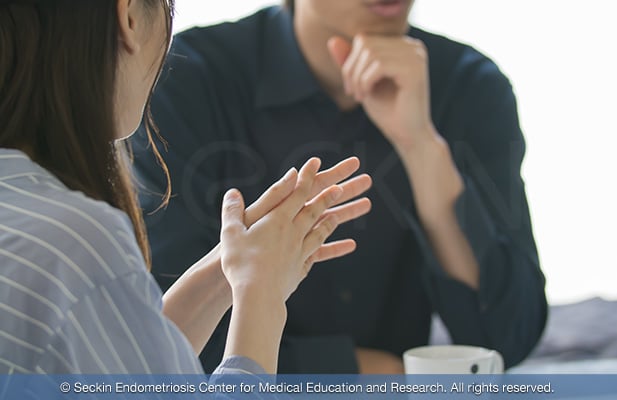Family Support for Women With Endometriosis
Endometriosis is a condition that is characterized by chronic pain and fatigue. It can affect a person’s ability to perform normal daily activities, fulfill professional work, have intercourse, have children, and maintain healthy personal relations. Endometriosis may not have any visible signs. So, it can be difficult for others to understand how the disease affects a patient’s life. However, family support is crucial.
How can endometriosis affect a woman’s family life?
Effect on sexual life
Because intercourse has the potential to cause pain (dyspareunia) for some women with endometriosis, this may make one fearful of the intimacy that may lead to intercourse. One may also find it difficult to communicate this fear, which may lead to feelings of guilt. Women with endometriosis who experience pain with intercourse may fear losing their relationship. They may think that their unwillingness to engage in intimacy will be interpreted as rejection.
Not being able to talk about these feelings and piling them up can lead to feelings of anger, frustration, confusion, sadness, or disbelief. However, not communicating one’s fears and experience may look from an outside perspective like they are shutting out their partner to avoid burdening them. Or they may presume that their partner would not understand their situation. Thus, endometriosis not only affects a woman’s life but also that of their partner.
Effect on personal interactions
Chronic pelvic pain or episodes of escalated pain may lead those in pain to isolate themself from others. This can have a negative effect on their interaction with family members. They may cancel or postpone social activities such as outings and family visits. Family members may negatively perceive this behavior, which could have a negative impact on family relationships.
Effect on fertility
Endometriosis may lead to infertility in some cases. This can be difficult and stressful for both the patient and their partner. It may even put a strain on the relationship. Moreover, It can cause anxiety and worry if they plan to have children. It can sometimes affect their plans of having children. Some couples might try to rush and have children earlier as they worry that endometriosis may worsen the woman’s condition. Others may drop the idea of having children altogether as they want to concentrate on taking care of their health. Some couples may feel that they are faced with a difficult choice between having children and accessing treatment. This is because the majority of medical endometriosis treatments act as a contraceptive as well.
Due to the significant amount of physical and emotional stress that endometriosis causes, it is crucial that the patient receives continuous support from the people who are near and dear to them.
How can the family help?
Understanding the patient’s condition
It can be difficult to understand the pain or fatigue that the patient experiences. However, family members can help by learning more about endometriosis and chronic pelvic pain.
The severity of the symptoms may differ on a day-to-day basis. So, the family must be flexible and understanding and learn to live with the ups and downs. This means accepting periods of severe pain and extreme tiredness. Family members must also learn to understand when something is out of the norm and requires medical attention.
Help with isolation
A 2016 study found that patients with endometriosis develop progressive social isolation following the onset of chronic pain in their lives [3]. Family members and friends can help by planning appropriate activities whenever possible and staying involved within their loved one’s social calendar. On days where the pain may be too bad to go out of the house, social activity within the household, no matter how minimal (such as offering to watch a movie or television together), may help with feelings of social isolation.
Help with daily activities
Family members can help the patient in performing their normal daily activities, making sure that their immediate needs are met. This is especially important during times when pain, discomfort, and fatigue do not allow one to ideally care for themselves. This may mean helping with meals, doing the dishes, helping with laundry, or buying groceries or other necessary toiletries.
Communication

It can be hard for the patient to communicate her feelings, needs, and wants. This may lead to anger, frustration, and quarrels with family members. The patient may also feel burdened blaming themselves for all the stress, instead of the condition of endometriosis itself.
Thus, communication is very important. This way, the patient could open up their heart and honestly discuss their internal feelings with their close ones. This can provide great comfort and help reduce the emotional stress that they are going through.
Family members can also attend family support group meetings that provide an opportunity to discuss common issues such as diagnosis, treatments, pain management, diet, exercise, and lifestyle modifications. Such meetings can provide support and encouragement to the family members.
Finally, family members can also help arrange appointments with psychologists and counselors. These professionals can help patients (and their families) deal with the stress associated with endometriosis.
Get a Second Opinion
Our endometriosis specialists are dedicated to providing patients with expert care. Whether you have been diagnosed or are looking to find a doctor, they are ready to help.Our office is located on 872 Fifth Avenue New York, NY 10065.
You may call us at (646) 960-3080 or have your case reviewed by clicking here.